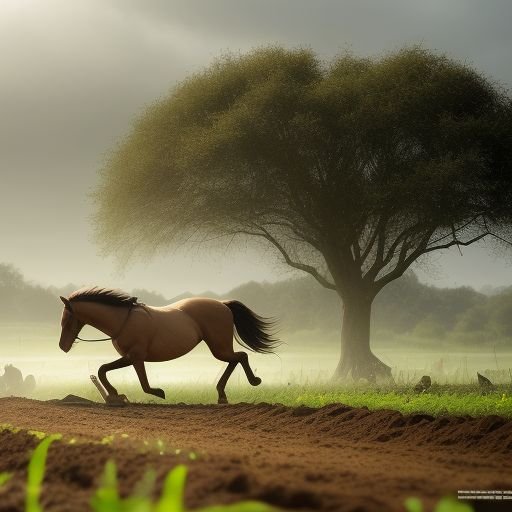Bad luck? Good luck? Who knows?
Once upon a time an old, hard-working farmer and his son lived in a village close to a border with barbarian territories. They worked a small farm and had only a single horse which plowed the field for their seeds and crops and transported them to the market. The horse was essential for the farmer and his son to earn their livelihood.
One day the horse broke through the fence and ran away. When the neighbours found out that the only horse the farmer had, had run away, they came to solace him. They said “Your only horse has run away just before the planting season. How will you till the land? How will you sow the seeds? This is really unfortunate. What bad luck.”
The farmer replied – “Good luck? Bad luck? Who knows?”
A few days later the farmer’s horse found its way back and brought along two other wild horses, thus increasing the farmer's property.
When the neighbours found out the news, they said ” Now you have three horses! You can till the land much faster with three horses. Maybe you can buy more land and sow more crops and make more money. Or you can sell the other two horses. Either way, you will be a rich man! What good luck! “
The farmer replied – “Good luck? Bad luck? Who knows?”
Next morning, the farmer’s son started training the wild horses so that they would help till the land. While trying to ride one of the wild horses, he fell and broke his leg. Just before the sowing season, the son with his broken leg would now not be able to help the farmer. The neighbours came once again and commented – ” This is really unfortunate. What bad luck.”
The farmer replied – “Good luck? Bad luck? Who knows?”
A few days later, the king’s men visited each village in the kingdom. They were enlisting the eldest son from each family to join the army to fight a war against the barbarians. When they came to the farmer’s house they saw the son with the broken leg and determined he would not be of much use in the army. Hence they didn’t take him. He was the only eldest son in the entire village who was not forcibly taken by the king’s men to fight the war. The neighbors, some of them with teary eyes, came once again to the farmer and commented “Your son breaking his leg was really fortunate. He is the only one who was not taken. What a stroke of good luck.“
The farmer replied – “Good luck? Bad luck? Who knows?”
This parable of a farmer and his son describes a series of events that show up without notice or influence on their part. Each event has potential significant consequences, and are immediately judged by the neighbours as either good or bad.
We all have this tendency to interpret events as either good or bad. Events happen and we make up a story to explain and extrapolate with associated feelings. Often we do it unconsciously. When we interpret events as good luck, we are usually happy, and when we interpret things as bad luck we are usually anxious, sad or angry at this so-called unfair misfortune. Yet most events, like in the story, are just events! They are like the rain that falls on whatever and whomever is below. Many events in our lives just happen. There is often nothing we can do to alter the immediate outcomes except accepting them and moving on as best we can - being aware of whatever story we are making up about them and possible consequences. Like in the story, we actually don’t know what is good luck or bad luck. We feel good when we feel we’ve been lucky, and we worry when we feel something is not good.
Mark Twain described this tendency to worry as a consequence of the stories we make up this way: "I am an old man and have known a great many troubles, but most of them never happened. Worrying is like paying a debt you don't owe. I have spent most of my life worrying about things that have never happened."
This Good luck / Bad luck story is an ancient one that is often invoked to express the idea of "silver lining" or "blessing in disguise" in Chinese, Vietnamese, Korean, and Japanese cultures. The wise old farmer knows everything is an interplay of Yin and Yang, of light and shadow, of happiness and unhappiness. Since it is impossible to recognise the future consequences of an event - and thus to know what is really 'good luck' or 'bad luck' - the wise farmer's reaction to these events is one of stoic equanimity, and thus the appropriate reaction.
Marcus Aurelius, the last of the good Roman Emperors, was also a practitioner of the philosophy called Stoicism which emphasises that external events are beyond our control, but our reactions and attitudes are not. So he maintained focus on what you can control and stop fretting about things you have no control over.
Some sayings from Marcus Aurelius that are similarly implied by the old farmer parable:
“If you are distressed by anything external, the pain is not due to the thing itself, but to your estimate of it; and this you have the power to revoke at any moment.”
“You have power over your mind - not outside events. Realise this, and you will find strength”.
“You always own the option of having no opinion. There is never any need to get worked up or to trouble your soul about things you can't control. These things are not asking to be judged by you. Leave them alone.”
And finally, similar wisdom from William Shakespeare in Hamlet: '“There is nothing either good or bad, but thinking makes it so”.


